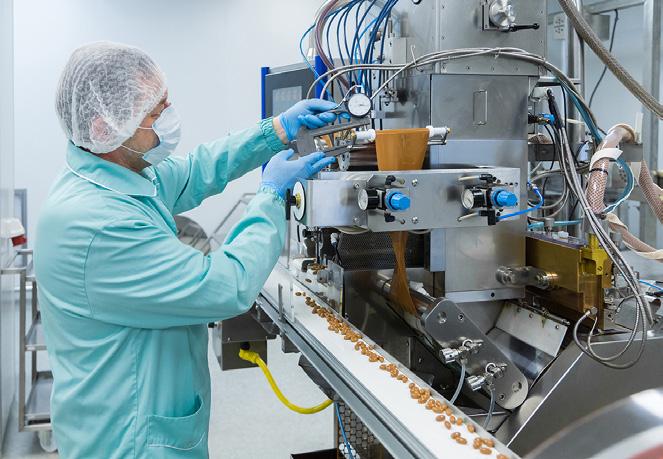
6 minute read
Food industry and food innovation: Thailand’s path to global leadership
Thailand Board of Investment (BOI)
As the global food industry undergoes transformation driven by changing consumer preferences, sustainability imperatives, and technological advancement, Thailand is ambitiously positioning itself as a global agriculture and food hub. The government aims to elevate Thailand as a regional leader in high-value-added agri-food industries, serving as a launchpad for future food products, smart farming technologies, and functional nutrition innovations.
Key to this ambition is the promotion of processed and preserved foods, food additives, flavour enhancers, dietary supplements, and future food solutions such as plant-based proteins, insect-based ingredients, and cultivated meats. These sub-sectors not only enhance Thailand’s global competitiveness but also align with emerging global trends in food security, health consciousness, and climate resilience.
TRENDS IN THE PROCESSED FOOD INDUSTRY
Globally, the food processing industry is entering a new era, driven by changing consumer preferences and technological advancements. Consumers are demanding safer, healthier, and more sustainable food. The rise of the health and wellness economy has spurred growth in functional foods and supplements, while concerns about shelf-life, logistics, and food waste are driving demand for advanced preservation techniques.
Key trends include a growing demand for healthy, sustainable, and plant-based foods, with plant-based meat and dairy alternatives gaining traction. Additionally, there is a surge in demand for ready-to-eat and functional foods, such as fortified snacks and medical nutrition products, catering to busy lifestyles and health-conscious consumers. Sustainability is another critical driver, with innovations like intelligent packaging and traceability systems enhancing food safety and reducing waste. In Thailand, these trends align with the rise of “Future Food” categories, including organic products, functional foods, medical foods, and novel proteins like insect-based or lab-grown alternatives, positioning the country to capitalise on global demand and innovation.
THAILAND’S COMPETITIVE EDGE
Thailand ranks among the top countries in the world for food export efficiency, with extensive cold chain capabilities, deep-sea ports, regional connectivity to ASEAN, and proximity to high-growth markets like China and India. Thailand also benefits from a skilled and adaptive labour force. Over 38 per cent of the workforce is employed in agriculture and agro-industrial sectors, and numerous universities and technical institutes are providing vocational training programs tailored to industry needs in food science, biochemistry, biotechnology, and logistics management. In addition, Thailand’s food ecosystem is strengthened by well-developed infrastructure such as Food Innopolis, a research and innovation hub for the food industry.
Thailand’s domestic market, with a population of over 70 million, is a significant consumer base for processed foods, driven by urbanisation and rising disposable incomes. Internationally, Thailand is a top exporter, with agricultural exports having reached US$53 billion in 2024, a 6 per cent increase in compared to 20231. Key markets include ASEAN, China, Japan, and the Middle East, where Thai products like canned seafood, frozen fruits, and snacks enjoy strong demand. The growth of Thailand’s food and agricultural exports partly comes from a wide coverage of free trade agreements (FTAs) that Thailand signed with 24 countries/economies. These FTAs give Thailand access to a market of nearly one-third of the global population. In addition, every year Thailand hosts THAIFEX— Anuga Asia, one of the biggest Food Fairs in Asia, which in 2024 attracted over 85,000 visitors from 131 countries/regions, and over 3,100 exhibitors.
Moreover, Thailand enjoys a raw material abundance, ranging from tropical fruits, rice, and herbs to alternative protein sources like crickets and soy. Local sourcing ensures supply chain resilience, while reducing import dependencies for food manufacturers.
Thai food processing plants are globally recognised for meeting international standards, such as ISO and HACCP, ensuring high-quality output. The country’s abundant agricultural resources, including rice, fruits, and seafood, provide a steady supply of raw materials, reducing production costs and enhancing competitiveness.
Thailand’s reputation as a culinary powerhouse is bolstered by its diverse cuisine and global restaurant presence. Thailand being branded as the “Kitchen of the World” is more than a mere slogan — it is backed by decades of global trust in its food safety, quality, and consistency.
1 https://thailand.prd.go.th/en/content/category/detail/id/2078/iid/363305
ATTRACTING INVESTMENT IN FOOD PROCESSING
For investors, Thailand represents a low-risk, high-reward environment for food industry ventures. FTAs with major economies, such as China, Japan, and Australia, further reduce barriers to market entry. Investors can tap into Thailand’s established supply chains, which seamlessly connect farmers, processors, and distributors. The value chain is well-developed, with opportunities spanning from primary processing and ingredient manufacturing to value-added product development and premium health food production. The government’s focus on innovation, through initiatives like Food Innopolis and the Food Industrial Transformation Center, fosters the development of high-value products.
In addition, the trend toward sustainable and climate-smart food production has created new demand for eco-innovative processing, upcycled ingredients, and zero-waste operations – all areas where Thailand’s private sector and startups are becoming increasingly active. Major global food corporations such as CP, Thai Union, Betagro, and Tipco already have strong R&D and manufacturing bases in Thailand, but there is also room — and readiness — for more foreign direct investment, particularly in joint R&D ventures, innovation incubators, and next-generation food labs.
BOI INCENTIVES: EMPOWERING FOOD INNOVATION
Thailand’s Board of Investment (BOI) offers one of the most competitive incentive packages in the region to attract investors to the food innovation sector. These incentives reflect the government’s commitment to enhancing Thailand’s position in high-tech and sustainable agri-food industries. In recent years, several companies have invested in Thailand and received investment promotion from the BOI, such as Global Bugs Asia Co. Ltd. (Thai-Swedish), and Flying Spark (Thailand) Co. Ltd. (Thai-Israeli).
Note: Table of Eligible activities for investment promotion related to food industry and food innovation is available in GTCC UPDATE's pdf version only.

LOOKING AHEAD
With a growing global population, rising health awareness, and increased pressure on agricultural systems, the future of food will depend on how well countries can innovate, scale, and sustain production. Thailand is answering this challenge with vision, capability, and commitment. As a proven food production powerhouse with unmatched access to ingredients, global markets, and policy support, Thailand invites investors to co-create the next chapter of the global food story — one that is healthier, smarter, and more sustainable.
Whether you are a multinational food brand, a biotech startup, or a future food innovator — Thailand is your gateway to success in Asia’s food innovation frontier.
Contact details:
Thailand Board of Investment (BOI)
Tel: +66 2 553 8111










